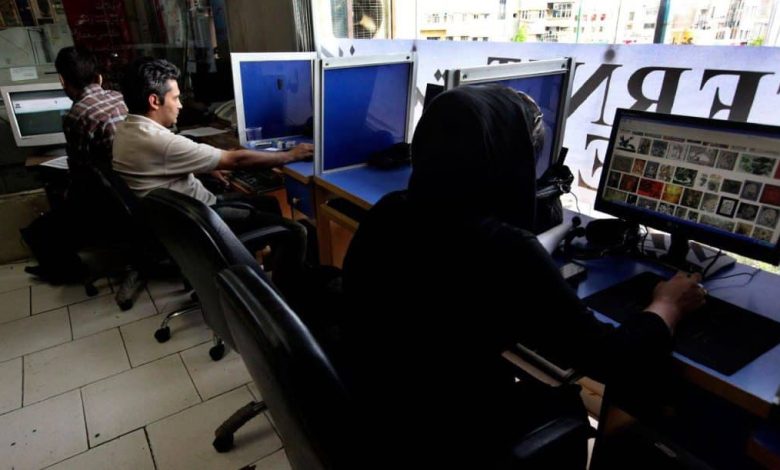Int’l Community’s Moral Obligation Rises When Iran’s Regime Targets Internet

Written by
Mansoureh Galestan
Like the scholastics during the dark ages, Iran’s ruling theocracy opposes any sort of technology and science. Like the priests in the medieval ages, the mullahs in Iran are hostile toward any development as they fear knowledge would end their rule based on superstition.
While countries across the globe are racing toward having faster internet services, Iran’s ruling theocracy desperately tries to control social media and imposes internet blackouts.
In recent days, more than a dozen Iranian cities witnessed protests due to the skyrocketing prices. Since people are aware of the regime’s role in creating and worsening their economic woes, they soon chanted slogans against officials, such as the mullahs’ Supreme Leader Ali Khamenei and his president Ebrahim Raisi.
These protests erupted soon after Raisi’s government eliminated the preferential currency rate, which was used to import essential goods such as flour, wheat, and medicine at a lower price. Raisi made a great deal of fanfare about combatting corruption steamed from the preferential rate, but in fact, his government would earn around $8 billion at people’s expense.
When people poured onto the streets to demand their rights, the “hanging judge” and his mentor Khamenei responded violently. Videos from Iran show security forces brutalizing unarmed protesters, and at least six people have been killed so far.
As demonstrations spread across the nation, the Iranian regime imposed an internet blackout to freely crackdown and stifle any block of the spread of the news about the protests both inside and outside Iran.
Netblocks, which monitors network connectivity across the globe, registered internet disruption in Iran.
⚠️ Confirmed: Real-time network data show a brief collapse in observable international connectivity on internet provider Rightel in #Iran, as well as a deterioration on other mobile and fixed-line providers; the slowdown may limit the free flow of information amid protests 📉 pic.twitter.com/uuzu2uYduB
— NetBlocks (@netblocks) May 11, 2022
While Iranian activists spoke of internet disruption, and as Netblocks and Amnesty International confirmed it, Raisi’s minister of communication rushed to the scene to deny the undeniable.
“I vehemently deny that we have reduced the country’s bandwidth; the internet speed is based on the data volume. Now there are authorities in the world that measure the speed of the Internet. Yesterday it was announced that Iran’s rank has increased even and has reached the 73rd rank,” state-run Aftabnews quoted Isa Zarepour on May 17.
Recent footage of the regime’s violent crackdown as well as reports by independent sources such as the Netblock debunked Zarepour’s brazen remarks.
The regime has a song to control the internet and social media. Khamenei has long sought and insisted on “controlling the internet,” and his parliament recently ratified the so-called “internet protection plan bill.”
In his speech on July 20, 2021, he expressed his utter fear of social media, describing the need to control it as his regime’s “significant task at hand.” He added that officials should pay attention to it as a “key issue.”
The Iranian Resistance had previously published an exclusive report on the internet protection bill, which underlines that the regime intends to “disrupt citizen access to international services, primarily social media, and allow the regime’s security apparatus to control internet gateways in order to intensify suppression of dissent.”
Besides fearing the leak of their crimes online, the mullahs are very much afraid of the Iranian opposition’s growing influence in Iran. Many regime officials have acknowledged that youth join Iran’s leading opposition group, the Mujahedin-e Khalq (MEK).
“People spent hours on social media. Since we have lost control over cyberspace, the enemy has found the upper hand to improvise and implement its plans to influence the youth,” the state-run Kayhan daily, Khamenei’s mouthpiece, acknowledged on May 12.
“We should be vigilant about the MEK’s activities. They are trying to instigate riots using social media. They keep on speaking about the food shortage on social media,” Ahmadreza Shahrokhi, Khamenei’s representative in Khoramabad, northwest Iran, said during the Friday prayer sermon on May 13.
Ironically, even though the regime continues its rhetoric about the enemy using social media and has leaped forward to ban the internet, it has one of the world’s largest cyber armies to generate fake news and identify and arrest dissidents.
A comprehensive report by the Iranian Resistance on April 1st peered into the gloom about the regime’s dangerous presence online.
“Aside from a few dozen military and security organizations that specialize in terrorizing the Iranian society and the world, the clerical regime is known to have a vast intelligence and counterintelligence complex to monitor, manipulate and dominate cyberspace,” the report reads.
“The network mainly carries out two types of operations. Most notorious is a cyberspace force that is responsible for hacking and other types of online assaults. Another, lesser-known and less technical force, whose tracking and identification has been less successfully documented, hasn’t been serving Tehran less, if not more,” the report added.
This is not a case where Iran’s ruling theocracy is waging war on technology as Don Quixote attacked the windmill, taking it as a monster. Tehran opposes anything that jeopardizes its rule. While the Iranian regime is terrified of cyberspace and its role during protests, the mullah’s real fear is of the Iranian opposition’s impact on the society using social media and the role of the internet in cracking the regime’s wall of disinformation and oppression.
Social media and the internet have indeed played an essential role in all conflicts in our time. The world was mobilized to the Ukrainian people’s aid, as it did during the November 2019 uprising.
So, the world community has a moral obligation to help Iranians who yearn for freedom and democracy. The international community should prevent the regime from spreading rumors and fake news by using a so-called “national internet” or continuing its human rights abuses and at the time have free reins to block Iranians’ access to the Internet and social media.

